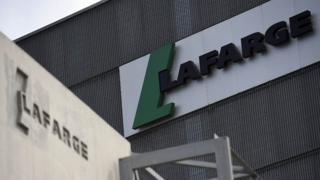 Image copyright
Image copyright
AFP
The dealings with armed groups took place before Lafarge merged with Holcim
Cement maker LafargeHolcim says it has uncovered evidence that a Lafarge factory in Syria provided funding to local armed groups.
It said those in charge of the Jalabiya plant had taken “unacceptable” measures in order to keep the plant open and protect employees.
Various armed factions “controlled or sought to control” the area, it said.
The plant in northern Syria was shut down in 2014, the year before France’s Lafarge merged with Swiss rival Holcim.
LafargeHolcim said the evidence was revealed by an internal investigation.
Sanctions-busting?
“At times, different armed factions controlled or sought to control the areas around the plant,” the firm said.
“It appears from the investigation that the local company provided funds to third parties to work out arrangements with a number of these armed groups, including sanctioned parties, in order to maintain operations and ensure safe passage of employees and supplies to and from the plant,” it added.
“In hindsight, the measures required to continue operations at the plant were unacceptable.”
At the time, Syria was subject to EU sanctions imposed on President Bashar al-Assad’s government, which has lost control of large swathes of the country to various armed groups.
The French government believes that Lafarge’s local officials bought oil in Syria to power the factory, in defiance of those sanctions, according to the French news agency AFP.
At the same time, LafargeHolcim released better-than-expected fourth-quarter results, showing that underlying core earnings were up 15.5% year-on-year to 1.61bn Swiss francs (£1.3bn; $1.6bn).
Cement firm Lafarge paid Syrian armed groups}

